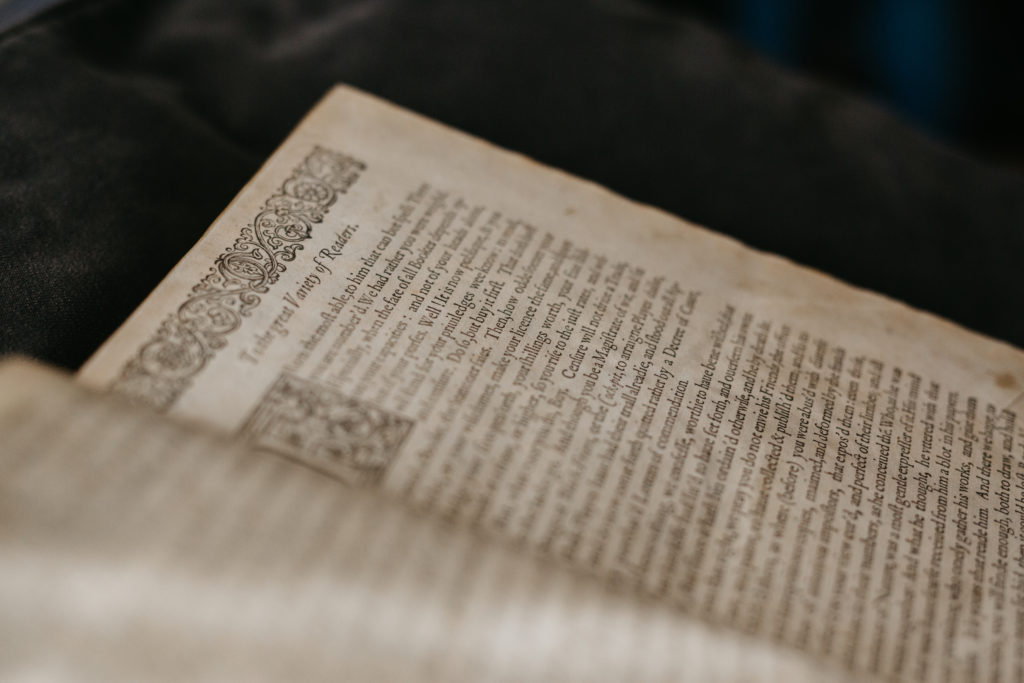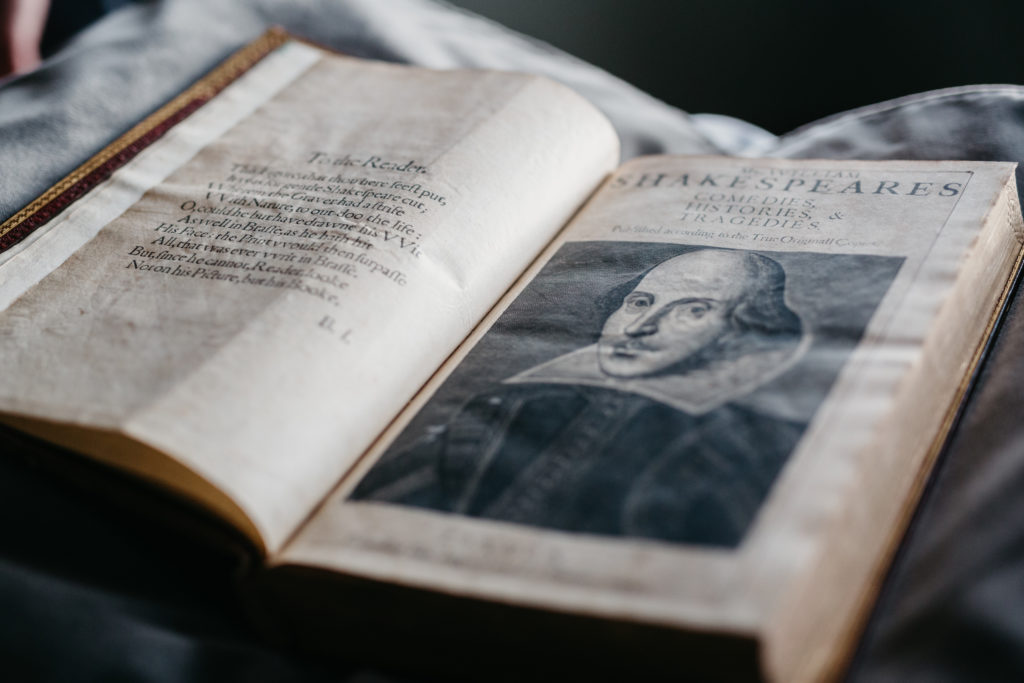William Shakespeare’s First Folio published in 1623 gifted to UBC Library
The University of British Columbia has acquired a complete first edition of William Shakespeare's Comedies Histories and Tragedies—an extremely rare book published seven years after Shakespeare's death and credited with preserving almost half of his plays.
The University of British Columbia has acquired a first edition of William Shakespeare’s Comedies Histories and Tragedies—an extremely rare book published seven years after Shakespeare’s death and credited with preserving almost half of his plays.
The First Folio, as it’s also known, includes 36 of Shakespeare’s 38 known plays, edited by his close friends, fellow writers and actors. The 1623 publication is considered the most authoritative of all early printings.
UBC purchased the First Folio, formerly owned by a private collector in the U.S., through Christie’s New York with funding provided by a consortium of donors from across North America and with the generous support of the Department of Canadian Heritage.
“In comparison to many of our peer institutions, we are a relatively young university library,” said University Librarian Dr. Susan E. Parker. “We are deeply grateful to the many foundations and individual donors who have been essential in making an acquisition like this possible for a place like UBC Library and we are honoured to be its caretakers.”
The opportunity to purchase a First Folio arose in early 2021. Katherine Kalsbeek, head of rare books and special collections (RBSC) at UBC Library, knew that with so few copies left in private hands the library had to act.
“The First Folio is a cornerstone of English literature and with this donation, we are able to bring this cultural treasure into public ownership,” Kalsbeek said. “Adding a First Folio to the UBC Library collection represents a milestone in terms of our development as both a library and as a university.” Only 235 copies of the First Folio remain around the world, mostly in the U.K. and U.S. The nine copies in public collections on the west coast are all in California. This cultural treasure is only the second copy in Canada.
“Preserving this precious book in UBC Library makes it accessible for future generations, inspires new knowledge, and furthers our commitment to engage in world-class research in the arts and humanities,” said Santa J. Ono, UBC president and vice-chancellor.



UBC’s acquisition of the Folio has placed this tangible piece of humanity’s heritage within reach for an enormous number of people who might otherwise have never had access to it.
The acquisition comes with a mandate to ensure public access to the unique volume. UBC’s department of theatre and film, the emerging media lab at UBC, and the master of digital media program at the Centre for Digital Media plan to collaborate on augmented and virtual reality projects. UBC’s digital media plan for the Folio will not only engage new communities, but also amplify the value of one of the world’s most precious cultural treasures and make the wonder of Shakespeare accessible to everyone.
UBC is ideally positioned to partner with B.C. arts and cultural institutions such as the Vancouver Art Gallery to ensure an unprecedented level of public access and exposure to this treasured artifact.
“This is really a gift, not just to UBC, but also to the city of Vancouver and to the many people in the region who appreciate Shakespeare,” said Kalsbeek. “We thought it was very appropriate that we partner with the Vancouver Art Gallery and Bard on the Beach to present it to the Vancouver community before it ultimately comes to UBC to support research and teaching.”
In partnership with the Vancouver Art Gallery, this tangible piece of cultural heritage will be exhibited to the public from Jan. 12 to March 22 along with three subsequent 17th-century Folio editions of Shakespeare’s plays. The exhibition, For All Time – The Shakespeare FIRST FOLIO, marks the first time that all four Folios have been presented in Vancouver. The exhibition will be accompanied by an audio mobile guide featuring the voice of Christopher Gaze, founding artistic director of Bard on the Beach Shakespeare Festival, in addition to a series of public programs, including talks, performances and more. For further information, please visit vanartgallery.bc.ca.
Quotes
Dr. Linc Kesler, associate professor of First Nations and Indigenous Studies —
“The Folio was produced in a rapidly changing cultural economy in which printed artifacts, such as the Folio, began to displace, in popular culture, the largely oral culture of the stage and what had preceded it. As a Shakespeare scholar who has sought to understand the relationship of printed culture to the largely oral culture of my Indigenous grandparents and many others, I have consistently thought about that transition, its aftermath, and the value of better understanding it in understanding the many interactions of people, histories, and cultures that form our lives today.”
Dr. Patricia Badir, professor of English and head of the department of English language and literatures, UBC —
“Having the book here in Vancouver in 2021 on the unceded lands of the Musqueam people allows us to do what scholars around the world have been doing for a while now, and that is to think about Shakespeare’s work in place-based terms. The book’s presence here will provide us with opportunities to think about how Shakespeare’s works have been agents of colonialism and provoke us to think about the ways in which Shakespeare’s plays can help us think through local iterations of global questions about sexuality and gender, religious tolerance, politics and power, race and social justice, and even climate justice.”
Dr. Dennis Austin Britton, associate professor in the department of English language and literatures, UBC —
“Arguably, fewer books have been invested with as much magic and one of the things that this book is going to allow us to do is to literally touch the past and come into a very different type of contact with 17th-century England. One of the things that I’m excited to do with my students is to look at how the First Folio was actually arranged. When we encounter Shakespeare today in our classes, students usually buy single edition text or anthologies that are very heavily annotated with lots of lengthy introductions, and that’s not the way in which Shakespeare’s readers—at least the First Folio readers—would have encountered Shakespeare’s plays.”
Anthony Kiendl, CEO & Director, Vancouver Art Gallery —
“We are thrilled to co-present and host this capsule exhibition of the Folios at Vancouver Art Gallery. This project fits with the Gallery’s history of projects that explore the intersections of disciplines, media and popular culture; and places art in broader cultural contexts. The Gallery serves as an essential site in our community for us to come together, learn and discuss the ideas of our times—and Shakespeare’s work has provoked centuries of debate. This provides a compelling opportunity to come together with our partners and create something that none of us could accomplish singlehandedly on our own.”
Dr. Gregory Mackie, associate professor in the department of English language and literatures, UBC and Norman Colbeck curator at RBSC —
“This is something the whole community can get excited about and can rally around: the first printing of almost half of Shakespeare’s plays that would have been lost were it not for this book. It’s important to history, culture, and literature for so many people. It’s a tremendous moment for Arts at UBC. There are so many areas of the university that have played a role and stand to benefit. This is also a major acquisition for Canada as this Folio is being brought into the public realm and will be preserved and made accessible not only for the citizens of B.C., but also for all Canadians.”
Dr. Patrick Parra Pennefather, assistant professor in the department of Theatre and Film, UBC —
“Digitization projects that explore emerging technologies like augmented and virtual reality offer us an opportunity to create new partnerships, perspectives and reinvent how many of Shakespeare’s characters are perceived in our modern world.”
Margaret Ford, International Head of Books and Manuscripts, Christie’s —
“Christie’s was honoured to work with UBC to bring a book of such significance to world culture to western Canada. Here, it will be fully embedded in the university and wider community through wide-reading access and engagement programs, thanks to the vision and ambition of Katherine Kalsbeek and Dr. Greg Mackie. It has been one of the most gratifying projects of my professional life.”



